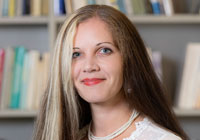
Photo credits:
Danish Saroee
Janina Neufeld
Pro Futura Scientia Fellow, SCAS.
Principal Researcher, Center of Neurodevelopmental Disorders at Karolinska Institutet (KIND),
and Department of Women's and Children's Health, Karolinska Institutet
Janina Neufeld received her PhD training at the Center for Systems Neuroscience Hannover, where
she investigated the brain mechanisms underlying synesthesia, a phenomenon where specific stimuli
automatically trigger additional sensory-like experiences. Subsequently, Neufeld completed two post-
doctoral training periods, one at the University of Reading, UK, and one at Karolinska Institutet in
Stockholm,
focusing on brain correlates of autism spectrum conditions. She developed her own line
of
research on the link between synesthesia and mental health conditions and was one of the first
researchers
to publish scientific evidence on the co-occurrence of synesthesia and autism.
Neufeld aims to elucidate the etiology of synesthesia and the risks and benefits associated with the
phenomenon, such as potentially increased vulnerability for sensory overload and certain mental health
conditions
and improved memory and sensory processing. Applying a twin design allows her to dis-
entangle genetic and environmental contributions to behavioral and brain alterations in synesthesia
and its association with mental health conditions. Neufeld further aims to generate new insights into
the etiology of autism and to differentiate the correlates of associated difficulties and talents.
Neufeld is collaborating both nationally and internationally with experts from various disciplines
(psychiatry,
genetics, epidemiology, neuroimaging, and perception). She has published many original
research articles on
altered brain function and perception in autism in internationally renowned journals,
including Nature Reviews
Neurology, Molecular
Psychiatry, the Journal of Child Psychology and
Psychiatry and Biological Psychiatry.
As a Pro Futura Scientia Fellow, Neufeld will focus on the link between synesthesia and mental health
conditions, with a special focus on obsessive compulsive disorder (OCD).
This information is accurate as of the academic year 2024-25.






